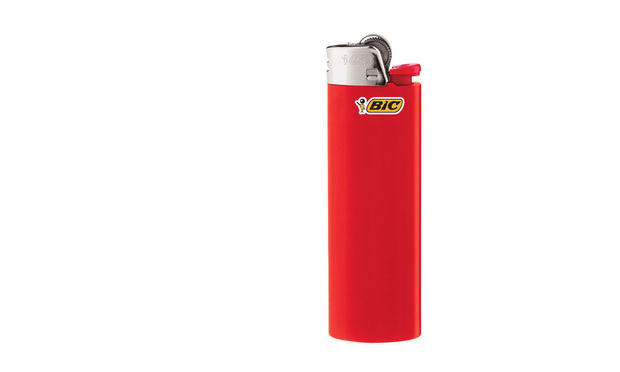BIC Files Trademark Infringement Complaints Against Counterfeit Lighter Manufacturers in China
The French company with a North American headquarters in Shelton, Conn. and a factory in the same state has filed a pair of trademark infringement complaints against alleged counterfeiters of their disposable cigarette lighters before the U.S. International Trade Commission and U.S. District Court for the Eastern District of New York.
December 06, 2018 at 11:15 AM
4 minute read

BIC Corp. and its New York-based vice president and general counsel, Steve Burkhart, are fired up over alleged knockoff lighters that are being made in China and imported into the U.S.
The French company with a North American headquarters in Shelton, Connecticut has filed a pair of trademark infringement complaints against the alleged counterfeiters and their stateside distributors before the U.S. International Trade Commission in Washington, D.C., and U.S. District Court for the Eastern District of New York in Brooklyn. The company has a factory in Connecticut that produces about 1 million lighters a day
 BIC general counsel and vice president Steve Burkhart.
BIC general counsel and vice president Steve Burkhart.“It seems like we've seen the proliferation of one thing after another of counterfeit products entering the American marketplace,” Burkhart said. He added that BIC filed the suits not only as part of an effort to keep the lighters in question out of the country but also to draw attention to the issue of intellectual property theft.
“This is international business model-type stuff with factories and investments that blatantly infringe our IP. That's what's different,” he said. But he stressed that the timing of BIC's action amid escalating trade tensions between the U.S. and China and the ramped up enforcement of trade secret theft enforcement actions, was “incidental.”
The complaints accuse the defendants of trademark infringement, trademark dilution, unfair competition, deceptive practices, false advertising and committing unlawful acts, including unlicensed importation. The suits seek to stop the importation of the alleged imitation lighters. BIC spent much of the past year building its suit for the ITC, which was filed Thursday, a day after the federal action was filed, Burkhart said.
The domestic distributors named in the suit are Arrow Lighter Inc. and the Milan Import Export Company, both of which are headquartered in California, and New York-based Excel Wholesale Distributors.
Arrow Lighter appears to be the biggest distributor among the three and has been importing lighters from factories in China for two decades, according to the company's LinkedIn profile. The profile also states: “At Arrow Lighter, we are constantly striving for better. Quality and service always comes first, the smallest details are never neglected.”
Arrow Lighter is one of the largest lighter manufacturers in the world and produces more than 700 million lighters a year, according to the company's website. An attempt to speak with a company representative was not immediately successful.
Also named as defendants are Zhuoye Lighter Manufacturing Co. Ltd., Wellpine Company Ltd. and Benxi Fenghe Lighter Co., Ltd.. The lighters in question are sold as MK, Tutu and Star brand names, according to BIC.
In preparing for the litigation, BIC hired experts to conduct surveys to determine whether consumers were buying the alleged imitation lighters and if they were confusing the products with BIC lighters. The complaints allege that the counterfeit lighters “create a likelihood of consumer confusion in the marketplace.”
The company also ran the competition's lighters through a series of tests to determine whether they met U.S. safety standards, from checking the amount of fuel in the lighters and measuring flame height to determining whether the lighters cracked when dropped, and they failed, according to Burkhart, who said the lighters were dangerous.
“Yeah, they took the time and effort to build the mold that makes the lighter look like ours and they used plastic that looks like ours. Everybody's familiar with the $25 Rolex watch. But this is different. This could hurt somebody,” he said.
Burkhart said he was still learning about the defendant distributors and their times to overseas suppliers, adding that he anticipated that other companies could be added as defendants as the discovery process unfolds.
BIC is being represented by Orrick, Herrington & Sutcliffe IP partner Peter Vogl, senior associate Christopher Cariello and managing associate Briggs Wright in New York.
CORRECTION: An earlier version of this article incorrectly described the complaints as copyright infringement actions.
This story was updated on Friday, Dec. 7 .
This content has been archived. It is available through our partners, LexisNexis® and Bloomberg Law.
To view this content, please continue to their sites.
Not a Lexis Subscriber?
Subscribe Now
Not a Bloomberg Law Subscriber?
Subscribe Now
NOT FOR REPRINT
© 2025 ALM Global, LLC, All Rights Reserved. Request academic re-use from www.copyright.com. All other uses, submit a request to [email protected]. For more information visit Asset & Logo Licensing.
You Might Like
View All
Google Fails to Secure Long-Term Stay of Order Requiring It to Open App Store to Rivals

'Am I Spending Time in the Right Place?' SPX Technologies CLO Cherée Johnson on Living and Leading With Intent
9 minute read
'It Was the Next Graduation': How an In-House Lawyer Became a Serial Entrepreneur
9 minute read
Renee Meisel, GC of UnitedLex, on Understanding and Growing the Business
6 minute readTrending Stories
- 1Varsity Brands Lures Aboard Keurig Dr. Pepper Legal Chief
- 2Federal Judge Warns of 'Serious Sanctions' on FDIC Over Document Retention
- 3Meet the Former NFL Player Now Back at Vinson & Elkins
- 4Inside Track: Cooley's Modest Proposal to Make Executives Safer
- 5Justified Termination Does Not Bar Associate Attorney From Unemployment Benefits, State Appellate Court Rules
Who Got The Work
J. Brugh Lower of Gibbons has entered an appearance for industrial equipment supplier Devco Corporation in a pending trademark infringement lawsuit. The suit, accusing the defendant of selling knock-off Graco products, was filed Dec. 18 in New Jersey District Court by Rivkin Radler on behalf of Graco Inc. and Graco Minnesota. The case, assigned to U.S. District Judge Zahid N. Quraishi, is 3:24-cv-11294, Graco Inc. et al v. Devco Corporation.
Who Got The Work
Rebecca Maller-Stein and Kent A. Yalowitz of Arnold & Porter Kaye Scholer have entered their appearances for Hanaco Venture Capital and its executives, Lior Prosor and David Frankel, in a pending securities lawsuit. The action, filed on Dec. 24 in New York Southern District Court by Zell, Aron & Co. on behalf of Goldeneye Advisors, accuses the defendants of negligently and fraudulently managing the plaintiff's $1 million investment. The case, assigned to U.S. District Judge Vernon S. Broderick, is 1:24-cv-09918, Goldeneye Advisors, LLC v. Hanaco Venture Capital, Ltd. et al.
Who Got The Work
Attorneys from A&O Shearman has stepped in as defense counsel for Toronto-Dominion Bank and other defendants in a pending securities class action. The suit, filed Dec. 11 in New York Southern District Court by Bleichmar Fonti & Auld, accuses the defendants of concealing the bank's 'pervasive' deficiencies in regards to its compliance with the Bank Secrecy Act and the quality of its anti-money laundering controls. The case, assigned to U.S. District Judge Arun Subramanian, is 1:24-cv-09445, Gonzalez v. The Toronto-Dominion Bank et al.
Who Got The Work
Crown Castle International, a Pennsylvania company providing shared communications infrastructure, has turned to Luke D. Wolf of Gordon Rees Scully Mansukhani to fend off a pending breach-of-contract lawsuit. The court action, filed Nov. 25 in Michigan Eastern District Court by Hooper Hathaway PC on behalf of The Town Residences LLC, accuses Crown Castle of failing to transfer approximately $30,000 in utility payments from T-Mobile in breach of a roof-top lease and assignment agreement. The case, assigned to U.S. District Judge Susan K. Declercq, is 2:24-cv-13131, The Town Residences LLC v. T-Mobile US, Inc. et al.
Who Got The Work
Wilfred P. Coronato and Daniel M. Schwartz of McCarter & English have stepped in as defense counsel to Electrolux Home Products Inc. in a pending product liability lawsuit. The court action, filed Nov. 26 in New York Eastern District Court by Poulos Lopiccolo PC and Nagel Rice LLP on behalf of David Stern, alleges that the defendant's refrigerators’ drawers and shelving repeatedly break and fall apart within months after purchase. The case, assigned to U.S. District Judge Joan M. Azrack, is 2:24-cv-08204, Stern v. Electrolux Home Products, Inc.
Featured Firms
Law Offices of Gary Martin Hays & Associates, P.C.
(470) 294-1674
Law Offices of Mark E. Salomone
(857) 444-6468
Smith & Hassler
(713) 739-1250






